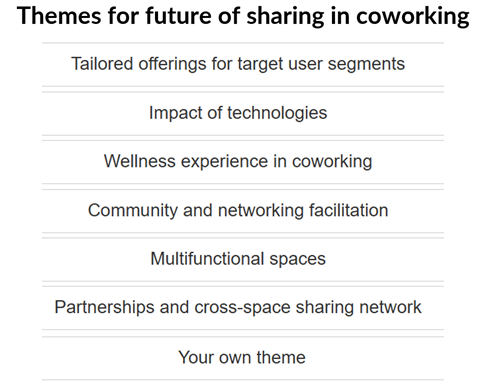In the ‘Resourceful sharing’ (JAVIST) project, sharing is used to co-develop the current teaching and innovation spaces with the key stakeholders. The development efforts contribute to advancing sharing in regional businesses and ecosystems. Within the project, we collaborated with 20 coworking cases and conducted two online workshops on the latest practices and future trends of coworking. The workshops are collaboratively facilitated by IFMA Finland (the Finnish Chapter of the International Facility Management Association) and Aalto University from the JAVIST project together with Aalto Campus & Real Estate, University of Helsinki, and City of Helsinki. These sessions brought together coworking space operators, academic experts, and members of IFMA Finland to exchange insights. The aim was to promote the development of a sharing culture and disseminate proven operating models and practices.
The first workshop, held on 10 April 2025, focused on the latest practices in coworking. Project worker Chuyao Wang presented the good practices identified from 20 coworking concepts. Participants then shared their experiences and stories about sharing, and engaged in trainings inspired by these narratives.
Good practices
The key insights from the findings of good practices of coworking are as follows:
Both spaces and services are shared in the coworking spaces. Regarding shared spaces, the internal spaces within a coworking operator’s portfolio may include one single location or multiple locations. The coworking portfolio can also be extended through partnerships with other coworking spaces or universities, enabling users to access external partner spaces. As for services, business support services, community and networking facilitation services, and facility management services are provided in the good coworking practices. In addition to staff contributions, digital tools are also used to support coworking operations.
These insights formed the foundation for the workshop training discussions.
Trainings
To foster deeper conversations, we used 5 thematic cards to facilitate group and general discussions during the training (Figure 1). Each card represented a specific theme related to coworking practices.

Inspired by the cards, we had rich discussions on the following topics:
According to the feedback survey, participants also find the following content particularly interesting:
Future trends
In the second workshop, held on 15 May 2025, peer-to-peer sharing and great discussions were facilitated around the key themes for the future of sharing in coworking (Figure 2). Valuable insights were gained on the following themes:

Text: Chuyao Wang and Tuuli Jylhä, Aalto University.
Resourceful sharing project is co-funded by European Union. Please find more information on the project HERE.